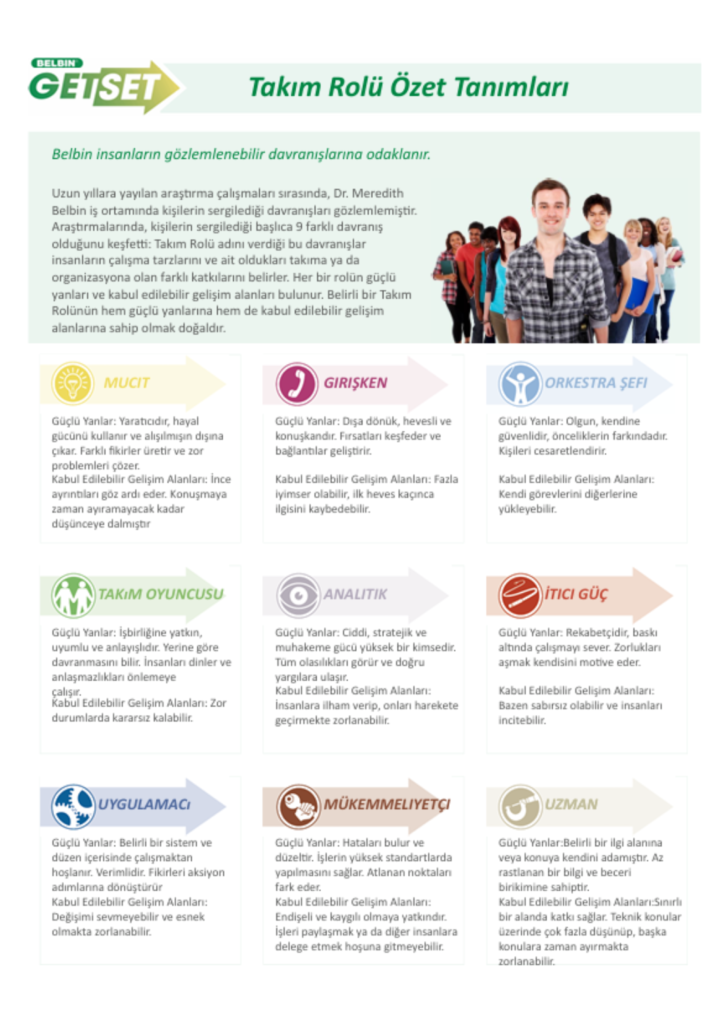Career journey is both exciting and complex for young people. During this process, it is crucial for individuals to understand themselves, discover their talents, and choose the right career path. This is where the Belbin GetSet Test comes into play, designed to help young people understand the importance of their behaviors and make more informed career decisions.
History and Development
Based on research conducted by Dr. Meredith Belbin in the 1970s at Henley Management College, the Belbin GetSet, emerged as a behavioral assessment tool aimed at identifying individuals’ roles within a team. This tool, particularly developed for students and young adults entering the workforce, builds on the idea that different team members can assume various roles that significantly impact team performance.
Execution and 360 Degree Evaluation
Belbin GetSet Test is typically conducted online and includes questions about behaviors, participants have exhibited in certain situations they have encountered before. The test not only looks at the student’s personal assessment but also considers observations from people who know them well (teachers, family members, friends, etc.). This helps to reveal how participants portray themselves and interact with others around them.
Example Report(in Turkish):
Appropriate Ages
Belbin GetSet Test is ideal for middle school, high school, and college students, as well as young adults entering the workforce.
Impact on Career Choice
Belbin GetSet aims to identify suitable careers based on students’ behavioral preferences and perceptions in their environment. It also helps increase students’ personal awareness, enabling them to understand which types of jobs are more suitable for them.
Many students are often guided by their grades when choosing a college major. However, grades alone are not sufficient to determine which profession is suitable. GetSet argues that individuals’ interests and competencies can change over time, and it aims to help everyone discover their potential strengths.
Reliability
Belbin GetSet Test is supported by extensive research and has proven reliability. Its internal consistency is typically measured with Cronbach’s alpha coefficient, and values above 0.7 indicate reliability. The retest reliability demonstrates that the test produces consistent results over time, and Belbin tests have shown consistency in this regard.
Competitors and Differences
Competitors to the Belbin GetSet Test include popular tests such as the DISC Personality Test, Myers-Briggs Personality Test, and Holland Test. However, the distinctive features of the Belbin GetSet Test are:
- Reliability: Supported by extensive research and has proven reliability.
- 360 Degree Evaluation: The test offers a more comprehensive evaluation by relying not only on the individual’s own assessment but also on observations from those around them.
- Focus on Behaviors: Rather than assessing personality traits, it evaluates and reports behaviors, determining which roles an individual can take on within a team and their work style.
Application and Registration
Check our consulting process to see how to explore your education or career alternatives in 5 steps
For more information about the Belbin GetSet Test, please use the following contact methods:
- E-Mail: support@aposto.biz
- For Turkey: +90 531 101 67 69
- For Germany: +49 172 545 6662
- Contact page
- Request 15 Min free consultation: Link
The Belbin GetSet Test is a reliable and effective tool to guide teenagers and young adults on their career journey and help them discover their potential. By taking the test, you can get one step closer to determining the direction of your own career.
Resources
- Belbin, M. (2012). Team Roles at Work. Butterworth-Heinemann.
- Belbin official web site (httsps://www.belbingetset.com)
- Belbin Turkey web site(https://www.sierradanismanlik.com)
- Aritzeta, A., Swailes, S., & Senior, B. (2007). Belbin’s team role model: Development, validity and applications for team building. Journal of Management Studies, 44(1), 96-118.
- Furnham, A., Steele, H., & Pendleton, D. (1993). A psychometric assessment of the Belbin Team-Role Self-Perception Inventory. Journal of Occupational and Organizational Psychology, 66(3), 245-257.


